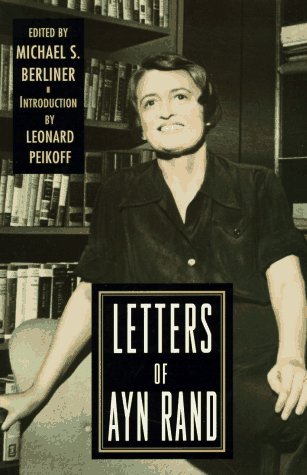It is a rare polemicist who makes a successful career in fiction. But in The Fountainhead (1943) and Atlas Shrugged (1957)—and with all the subtlety of dropping a grand piano on her reader’s head—Ayn Rand conveyed her harsh philosophy to a broad audience and gamed what has invariably been described as a cult following. Rand’s philosophy of Objectivism, which championed reason, egoism, and capitalism, viewed man as a “heroic figure.” Anything that detracted from his proper stature it cast furiousK’ aside. The church was thus a frequent target of Randian invective, for just as man should not subordinate his will to that of the mob, as the socialists demanded, neither should he kneel before any god.
While legendary for her ideological rigidity, Rand was not entirely without her virtues. In a collectivist age, she understood what made leftists tick, hi her published work and now in her Letters, she acknowledged the impotence of mere economic theory against an onslaught that was fundamentally moral and ideological. And as an inveterate enemy of any kind of religion, she was acuteK sensitive to the kind of secular eschatology and millennialism so common in socialist theory. (Rand thus dismissed both Christians and socialists as “mystics.”) Hence her criticism of Ludwig von Mises, perhaps the greatest economist of the 20th century. She was a great admirer of Mises, to be sure, but, like Murray Rothbard, Rand denied that the economist qua activist could divorce economics from ethics and still hope to be persuasive. Mises “did prove, all right, that collectivist economics don’t work,” she wrote. “And he failed to convert a single collectivist.”
But Rand took this appreciation of ideology to absurd lengths, hi her personal life, even trivia] events became charged with ideological significance. Her letters reveal, among other examples, a telling incident in which her young niece innocently asked her aunt and uncle to lend her $25. An extremely reluctant Rand agreed to lend the money, with a fixed repayment schedule, along with the following warning: “If, when the debt becomes due, you tell me that you can’t pay me because you needed a new pair of shoes or a new coat or von gave the money to somebody in the family who needed it more than I do . . . I will write you off as a rotten person and 1 will never speak or write to you again. . . . I would like to teach you, if I can, very early in life, the idea of a self-respecting, self-supporting, responsible, capitalistic person.”
Setting aside the pros and cons of lending this particular sum, the very idea of natural obligations was utterly foreign to Rand. “No honest person believes that he is obliged to support his relatives,” she wrote. “I don’t believe it and will not do it.” For Rand, every human relationship took on the character of a market transaction. She repeatedly denounced the idea, for example, that children necessarily owe their parents even respect or love. Everything in life must be earned. Anything else would be irrational, and therefore anathema.
Her understanding of Christianity—from her erroneous interpretation of the injunction to “love thy neighbor as thyself” to her ignorant and contemptuous dismissal of Original Sin—was simply embarrassing. But to explain such things to Rand would have been a waste of time. She had made up her mind. For the most part, she evaluated Christianity not as a creed that could be shown to be true or false but as a violation of her own private ethical system. Indeed, while Voltaire believed that if God did not exist, it would have been necessary to create him. Rand seems to have agreed with Bukharin: if God did exist, it would be necessary to destroy Him.
This is not to suggest that Rand believed nothing that could be described as religious. Her outlook, as she explained in her introduction to the 25th anniversary edition of The Fountainhead, was one of “man-worship,” a belief system shorn of religion’s “man-debasing aspects.” Protagonist Howard Roark, she explained to Frank Lloyd Wright, “represents my conception of man as god, of the absolute human ideal.” It is revealing that Rand’s ex-boyfriend, Nathaniel Branden, now writes books with titles like The Power of Self-Esteem and The Psychology of Self-Esteem. Man-worship must be depressing work.
If Russell Kirk was correct that the conservative shuns the confines of ideology. Rand did well to disassociate herself from the conservative movement. Here was a woman who formulated a distinct ideology and, to the exclusion of all else, proceeded to order her life, down to the smallest detail, according to its demands. Her letters will stand as a curious postscript to an exceedingly strange chapter in the history of philosophy.
[The Letters of Ayn Rand, edited by Michael S. Berliner (New York: Dutton) 681 pp., $34.95]

Leave a Reply